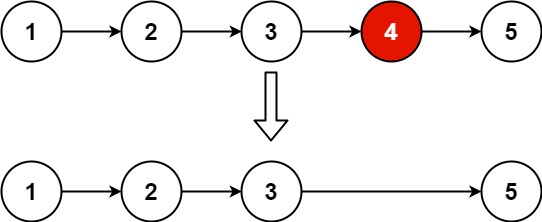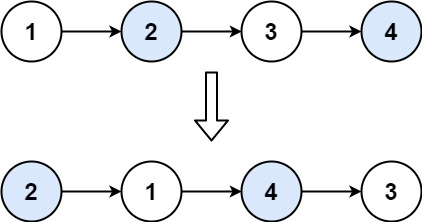Problem 876. Middle of the Linked List
-
Given the
headof a singly linked list, return the middle node of the linked list. -
If there are two middle nodes, return the second middle node.
Examples

- Example 1:
- Input: head = [1,2,3,4,5]
- Output: [3,4,5]
- Explanation: The middle node of the list is node 3.

- Example 2:
- Input: head = [1,2,3,4,5,6]
- Output: [4,5,6]
- Explanation: Since the list has two middle nodes with values 3 and 4, we return the second one.
Constraints
- The number of nodes in the list is in the range
[1, 100]. 1 <= Node.val <= 100
Solution
/**
* Definition for singly-linked list.
* function ListNode(val, next) {
* this.val = (val===undefined ? 0 : val)
* this.next = (next===undefined ? null : next)
* }
*/
/**
* @param {ListNode} head
* @return {ListNode}
*/
var middleNode = function(head) {
let node = head;
let answer = head;
let nodeCount = 0;
while (node) {
node = node.next;
nodeCount++;
}
let middleIndex = Math.floor(nodeCount / 2);
while (middleIndex) {
answer = answer.next;
middleIndex--;
}
return answer;
};Problem 19. Remove Nth Node From End of List
- Given the
headof a linked list, remove thenthnode from the end of the list and return its head.
Examples

-
Example 1:
- Input: head = [1,2,3,4,5], n = 2
- Output: [1,2,3,5]
-
Example 2:
- Input: head = [1], n = 1
- Output: []
Constraints:
- The number of nodes in the list is
sz. 1 <= sz <= 300 <= Node.val <= 1001 <= n <= sz
Solution
/**
* Definition for singly-linked list.
* function ListNode(val, next) {
* this.val = (val===undefined ? 0 : val)
* this.next = (next===undefined ? null : next)
* }
*/
/**
* @param {ListNode} head
* @param {number} n
* @return {ListNode}
*/
var removeNthFromEnd = function(head, n) {
let node = head;
let nodeCount = 0;
while (node) {
node = node.next;
nodeCount++;
}
if (nodeCount === n) {
head = head.next;
return head;
}
let removedNodeIndex = nodeCount - n - 1;
node = head;
nodeCount = 0;
while (node) {
if (nodeCount === removedNodeIndex) {
node.next = node.next.next;
}
node = node.next;
nodeCount++;
}
return head;
};Problem 24. Swap Nodes in Pairs
- Given a linked list
head, swap every two adjacent nodes and return its head.- You must solve the problem without modifying the values in the list's nodes (i.e., only nodes themselves may be changed.)
Examples

-
Example 1:
- Input: head = [1,2,3,4]
- Output: [2,1,4,3]
-
Example 2:
- Input: head = []
- Output: []
-
Example 3:
- Input: head = [1]
- Output: [1]
Constraints
- The number of nodes in the list is in the range
[0, 100]. 0 <= Node.val <= 100
Solution
/**
* Definition for singly-linked list.
* function ListNode(val, next) {
* this.val = (val===undefined ? 0 : val)
* this.next = (next===undefined ? null : next)
* }
*/
/**
* @param {ListNode} head
* @return {ListNode}
*/
var swapPairs = function(head) {
let answer = new ListNode(0);
let node = answer;
answer.next = head;
if (!head || !head.next) {
return head;
}
while (node.next && node.next.next) {
const node1 = node.next;
const node2 = node.next.next;
node.next = node2;
node1.next = node2.next;
node2.next = node1;
node = node.next.next;
}
return answer.next;
};Problem 2807. Insert Greatest Common Divisors in Linked List
-
Given the
headof a linked list head, in which each node contains an integer value. -
Between every pair of adjacent nodes, insert a new node with a value equal to the greatest common divisor of them.
-
Return the linked list after insertion.
-
The greatest common divisor of two numbers is the largest positive integer that evenly divides both numbers.
Examples

- Example 1:
- Input: head = [18,6,10,3]
- Output: [18,6,6,2,10,1,3]
Explanation:- The 1st diagram denotes the initial linked list and the 2nd diagram denotes the linked list after inserting the new nodes (nodes in blue are the inserted nodes).
- We insert the greatest common divisor of 18 and 6 = 6 between the 1st and the 2nd nodes.
- We insert the greatest common divisor of 6 and 10 = 2 between the 2nd and the 3rd nodes.
- We insert the greatest common divisor of 10 and 3 = 1 between the 3rd and the 4th nodes.
- There are no more adjacent nodes, so we return the linked list.
- The 1st diagram denotes the initial linked list and the 2nd diagram denotes the linked list after inserting the new nodes (nodes in blue are the inserted nodes).

- Example 2:
- Input: head = [7]
- Output: [7]
- Explanation:
- The 1st diagram denotes the initial linked list and the 2nd diagram denotes the linked list after inserting the new nodes.
- There are no pairs of adjacent nodes, so we return the initial linked list.
Constraints:
- The number of nodes in the list is in the range
[1, 5000]. 1 <= Node.val <= 1000
Solution
/**
* Definition for singly-linked list.
* function ListNode(val, next) {
* this.val = (val===undefined ? 0 : val)
* this.next = (next===undefined ? null : next)
* }
*/
/**
* @param {ListNode} head
* @return {ListNode}
*/
var insertGreatestCommonDivisors = function(head) {
const getGreatestCommonDivisors = (num1, num2) => {
const smallNumber = num1 > num2 ? num1 : num2;
for (let i = smallNumber; i > 1; i--) {
if (num1 % i === 0 && num2 % i === 0) {
return i;
}
}
return 1;
};
let node = head;
while (node && node.next) {
const node1 = node;
const node2 = node.next;
const greatestCommonDivisors = getGreatestCommonDivisors(node1.val, node2.val);
const divisorNode = new ListNode(greatestCommonDivisors);
node1.next = divisorNode;
divisorNode.next = node2;
node = node2;
}
return head;
};